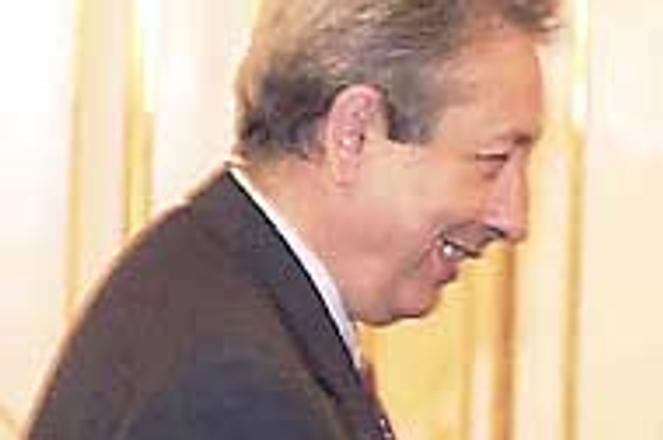KSS head Jozef Ševc (left) says he and President Schuster, a former communist, are "comrades".photo: TASR
IN ONE of the major surprises of 2002 elections, a party of unreformed communists is returning to the Slovak parliament for the first time in the decade-long history of independent Slovakia.
Although a political landscape littered with imploding leftist parties had led most analysts to discount die-hard socialists, the Communist Party of Slovakia (KSS) captured 6.32 per cent of the September 20-21 parliamentary vote, even winning one north-eastern district, giving them an 11-seat legislative caucus in the 150-member assembly.
Despite the repressive history of the communist experiment in Czechoslovakia and the dissolution of the Comecon trading bloc in 1989, the KSS leadership says that it is a modern, forward-looking leftist party that is looking out for the interests of Slovak citizens.
"The KSS is not a party of nostalgia, it's capable of self-reflection, it has learned. From this asset, the party wants to build up its image and completely fulfill all the campaign promises made to citizens," said party vice-chairman Ivan Hopta, who is also chief editor of the communist bi-weekly newsletter Úsvit.
The KSS remained unfazed by refusals from other parliamentary parties to cooperate in the legislature.
"We want to be a constructive opposition," said party chairman Jozef Ševc.
ŠEVC is Biľak's son-in-law.photo: TASR
Shortly after it became clear that the KSS would achieve more than five per cent of the vote and a parliamentary mandate, all other parties ruled out cooperation with the communists, with governmental Christian Democrats leader Pavol Hrušovský calling the result "sad", and opposition far-right Real Slovak National Party boss Ján Slota defining the KSS as "twisted".
"We don't want to criticize, but to build. Our predecessors surely showed something, and we are for the building of Slovakia," Ševc continued.
A long-time communist functionary, Ševc joined the Czechoslovak Communist Party in 1966 and graduated from Lomonosov University in Moscow in 1973 with a specialty in atomic energy.
Ševc is also married to the daughter of one of Slovakia's most infamous political figures, Vasiľ Biľak, the one-time first secretary and leading ideologue of the Czechoslovak communists.
Biľak, who lives in Bratislava's posh Palisády district, was the leader of a group of five communist hard-liners who delivered a letter to Soviet leader Leonid Brezhnev requesting Russian military intervention to quash the 1968 Prague Spring movement, in which Czechoslovak leader Alexander Dubček had attempted to create "socialism with a human face".
Biľak, the only surviving signatory of the Brezhnev letter, still faces possible prosecution for high treason, but his case has been continuously put off, most recently in March 2002 when Slovakia's Supreme Court returned his file to prosecutors for further investigation.
The election of orthodox communists to the Slovak parliament had many asking how it could have happened.
Analysts said that the communist vote had been a response to the political self-destruction of viable socialist alternatives.
While in 1998 the reformed communist Democratic Left Party (SDĽ) secured nearly 15 per cent of the vote, their support disintegrated in 2002 as infighting under party head and outgoing Agriculture Minister Pavol Koncoš led to the ouster of government ministers and the defection of many of the party's most popular politicians to the start-up Social Democratic Alternative (SDA).
With the SDĽ struggling with around three per cent in pre-election polls, leftist voters were faced with a bewildering choice between seven leftist parties and four communist parties, a situation that the KSS themselves credit for their success.
"If the SDĽ had conducted consistent leftist politics, the KSS today would not be on the scene," said KSS general secretary Ladislav Jača, one of the party's few full-time employees.
Sociologist Michal Vašečka agreed that the SDĽ leaders had shot themselves in the foot, opening the way for the communists to return to parliament.
"The KSS got to parliament [because of] the SDĽ. At the time when [the SDĽ] selected Koncoš as party chairman [in early 2002], they predicted they would gain voters from the KSS. The opposite happened. The party absolutely failed to realise that Koncoš is not a favourite among voters," said Vašečka.
While rejecting Slovakia's bid for Nato entry as expensive and unnecessary, the KSS does support some measure of integration with the European Union (EU).
"We want to be a dignified partner with every country in the EU, but not to be some kind of sub-producer or serve as lackeys in our own homeland. If it is to the advantage of the citizen and of Slovakia, we are in favour of [EU] integration," said Ševc.
Biľak, who has never voiced any regret for orchestrating the Warsaw Pact invasion of 1968 and the subsequent harsh 'normalisation' retrenchment of the 1970s, welcomed September's election results.
"I feel a great sense of fulfillment," he said upon learning that the KSS had made it back into parliament.
"Now it will be easier for me to die."


